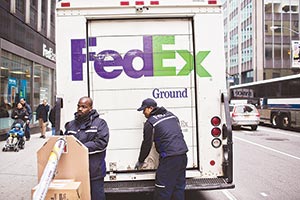FedEx Ground to Pay $240 Million to Settle Driver Classification Suits

This story appears in the June 27 & July 4 print edition of Transport Topics.
FedEx Ground settled an 11-year-old, nationwide lawsuit by agreeing to pay $240 million to 12,000 truck drivers who said they were misclassified as independent contractors rather than employees of the division of FedEx Corp.
The settlement affects drivers in 20 states whose legal cases were consolidated before the U.S. District Court in South Bend, Indiana. A judge will be asked to approve the agreement hammered out by attorneys for FedEx and the drivers.
News reports June 16, when the news broke, cited plaintiffs’ attorney Beth Ross of the Leonard Carder law firm. Ross was not available for comment, but FedEx Ground spokesman David Westrick confirmed the settlement.
“We are pleased to put this matter behind us, as it relates to a contract that has not been in use for a number of years,” Westrick said. “FedEx Ground has made enhancements to its business in anticipation of rapidly changing competitive, legal and regulatory conditions. We continue to strengthen our contractual relationships with service providers to deliver industry-leading service to our customers.”
The Pittsburgh-based Ground division delivers packages using trucks for FedEx, which ranks No. 2 on the Transport Topics Top 100 list of the largest for-hire carriers in the United States and Canada. The unit was built on using owner-operators rather than employee drivers.
As Westrick indicated, that strategy changed in 2011 when Ground shifted to using small fleets rather than owner-operators with just one truck.
Worker classification has been an important legal issue in trucking, with motor carriers, drivers and courts involved in deciding whether drivers should be considered employees or independent contractors, depending on how they operate.
The current settlement follows another independent contractor case in California, where Ground had to pay $226 million.
“The legal landscape for FedEx was mixed until August 2014. Prior to that time, FedEx had won a number of its earlier IC legal skirmishes and lost some,” said employment attorney Richard Reibstein in a Pepper Hamilton law firm blog.
“But all that changed when the 9th U.S. Circuit Court of Appeals in San Francisco slapped down FedEx in a blockbuster decision on Aug. 27, 2014, concluding that FedEx misclassified its Home Delivery and Ground division drivers as independent contractors as a matter of law,” Reibstein said, adding that the Kansas Supreme Court and the 7th U.S. Circuit also ruled in similar cases in 2014 and 2015.
“All of those decisions reached the same conclusion: ‘FedEx has established an employment relationship with its delivery drivers but dressed that relationship in independent contractor clothing,’ ” Reibstein said of FedEx’s pre-2011 operations.
The Ground legal issue was mentioned in the FedEx Corp. earnings report of June 21. For the fiscal year ended May 31, Ground legal matters reduced net income for the corporation by $158 million, or 57 cents a share.
For the fiscal year before that, all of the Ground legal effects were limited to the fourth quarter ended May 31, 2015, when corporate net income was reduced by $133 million, or 47 cents a share.
The company also announced that the U.S. Justice Department dismissed charges that FedEx illegally transported prescription drugs. Justice’s motion, made before U.S. District Court Judge Charles Breyer, was to rule after a weeklong trial concerning allegations that the company knew about carrying packages containing drugs sold overseas for delivery to U.S. customers.
FedEx could have faced fines of up to $1.6 billion. Charges were filed against the company in July 2014 in federal court in California, and the company chose to fight.
FedEx Chairman and CEO Frederick Smith said during the earnings call that the company’s attorneys “did an outstanding job representing our company.”
“FedEx has always been innocent of these charges, which should never have been filed. We strongly believe we should not admit the things we did not do and pay millions to avoid a criminal trial,” Smith said.
“FedEx delivered packages for licensed pharmacies registered by the federal Drug Enforcement Administration. Very few companies have done more during the last four decades to cooperate with law enforcement than FedEx, as was true in these matters, and we will continue to do so,” he said.
Senior Reporter Rip Watson contributed to this story.




